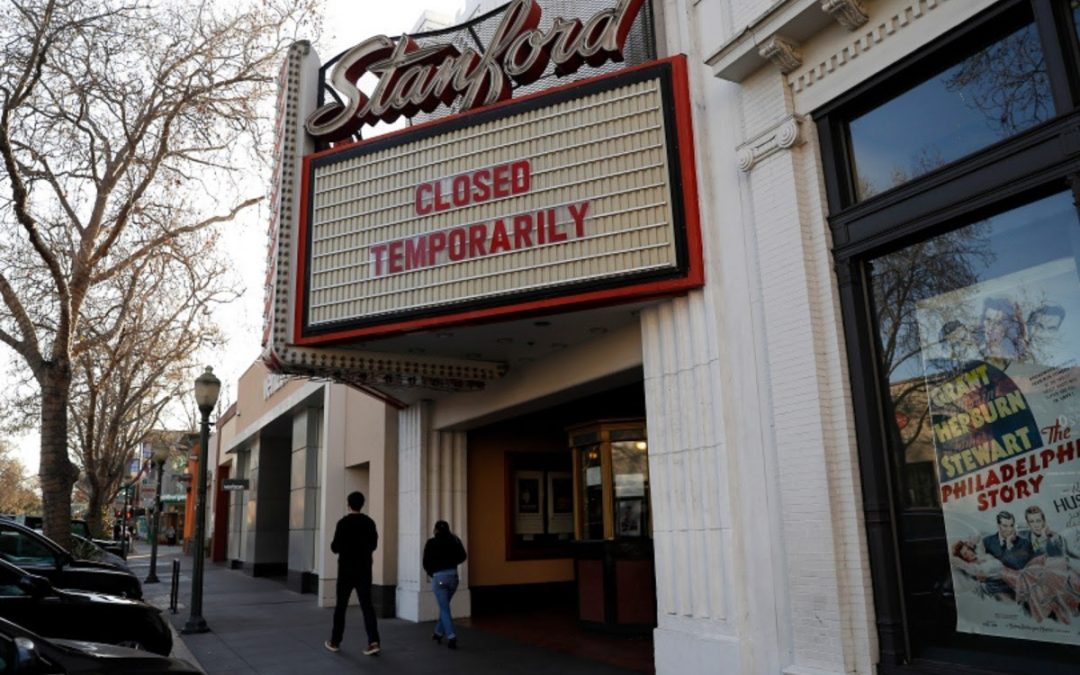A sign outside of the Stanford Theatre announced its temporary closure in downtown Palo Alto on March 4, 2020. Photo by Nhat V. Meyer, Bay Area News Group
Last week, the state of New Jersey became the subject to a lawsuit from the major movie theater chains AMC, Cinemark, and Regal (among others), claiming that forcing them to remain closed while other businesses got to reopen violated their constitutional rights. Given the continued threat of the Coronavirus pandemic, the reason for said closures in the first place, one might wonder why the state doesn’t just order those other businesses to stay closed so that they are all treated equally. After all, that seems to be the strategy taken by the state of California, which could set a major precedent given the state’s prominence in the nation overall.
On Monday July 13th, California governor Gavin Newsom reimposed previously lifted restrictions on the state’s businesses, citing a recent spike in Coronavirus cases throughout the state, as well as the rest of the nation. According to Newsom’s announcement, all counties were to shut down any indoor activities, including restaurants, bars, and entertainment centers like museums and movie theaters. In addition, many of the state’s more heavily populated counties were ordered to close fitness centers, personal care services, and other locations where large groups of people are restricted to a single space at a time.
The announcement comes as California has witnessed a resurgence of the Coronavirus in the weeks following the state’s phased reopening, as attempts to return things to normal have only made the disease more prevalent. As of Monday, there have been over 7,000 deaths and nearly 330,000 diagnosed cases in the state, with the most recent data showing almost 8,400 new cases and 23 deaths in a single day. With the numbers getting higher by the day, it’s no surprise that Governor Newsom has decided to pull back and return much of California to a state of almost complete shutdown.
This announcement comes as a huge blow to the movie theater industry. All of the major chains have already had to postpone their reopening schedules to later in July as opposed to their earlier July dates. Despite not having any major new releases to exhibit, most of the major chains had originally intended to show popular classics as a means of getting moviegoers reacquainted with the theatrical experience. This is a tactic that has proven effective with drive-ins and other outdoor theaters currently open, with “Stars Wars: The Empire Strikes Back” being last weekend’s #1 movie at the (currently very limited) box office.
According to the recent announcement, none of these chains’ California locations would be allowed to reopen until further notice. These theaters make up a significant portion of these companies’ business. Of Cinemark’s 345 theaters in the nation, 66 are located in California. 87 of Regal’s 543 theaters are also in California, as are 54 of AMC’s 661 theaters. Each of these chains has more locations in California than most of the other states, which means their ability to be open in California has a major impact on their ability to open throughout the rest of the country. Because they cannot reopen in California as originally intended, these companies may need to reconsider their reopening elsewhere in the nation.
Theaters aren’t the only component of the film industry that face the risk of shutdown as a result of California’s new restrictions. In fact, many businesses relating directly to the production and distribution of America’s film and television productions are located in the Los Angeles area, the county that is one of the most heavily impacted by Governor Newsom’s orders. When the original reopening phases had begun earlier last month, it was expected for production of many of the industry’s biggest releases was to resume. However, with these new orders put into place, there’s a strong chance that these productions will have to shut down once more, which would reduce the number of new releases coming out in the near future, even on streaming platforms that have been less affected by the pandemic.
It’s worth pointing out that despite the rising Coronavirus case numbers in California, there are many states faring even worse. Texas and Florida have also seen a dramatic increase in cases over the past few weeks, no surprise given that they are also heavily populated states. Whereas California has taken action however, neither Texas nor Florida have made any announcement to change course and close most of their major businesses, which could prove to be a major issue unless plans are changed as soon as possible. Florida itself already has more Coronavirus cases than most of the rest of the world, with many countries starting to successfully reopen now that they have the disease under control, something that Florida and many other states are not at the moment capable of doing.
Will movie theaters close their locations in these states as well, and any other states where the Coronavirus is seeing increases in numbers? Perhaps they will eventually, but until there are government mandates put into place that would force these businesses to close, other states will see the reopening of their many movie theaters by the end of July. Although this may be good for business, this may not be ideal for anyone seeking to enjoy the theatrical experience without having to risk their health. This is why it is so important to remain attentive to what is going on in California at the moment. If the movie theaters chains see their inability to reopen in California as a sign that it’s still not a good time to reopen, then they may be incentivized to remain closed throughout the rest of the country. There’s no guarantee this will happen, but with cases rising to alarming numbers in multiple states, and many of these states’ governments not taking the proper actions, theaters may need to put public safety over profit for a change.




